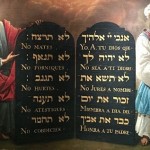 Mark 12:28-37
Mark 12:28-37
What is the greatest commandment? And why is it the greatest commandment?
Here are some answers that seem to be common in our culture:
“Thou shalt not offend thy neighbor.”
“Thou shalt not judge.”
“Thou shalt live and let live.”
“Thou shalt have the right to worship God or god any way thou wantest.”
“Thou shalt have the right to interpret the Scriptures in thine own way.”
“Thou shalt do what thou wilt, provided you can’t see any obvious way it hurts anyone.”
If you read the Bible or go to a liturgical church, you might know the answer even without thinking: to love God with all your heart, soul, mind, and strength. What we think about God’s commandments will tell us a lot about who we are before Him.
It’s easy to misjudge who God is, who we are, and what He requires from us if we look at the commandments in an atomistic way. With so many commandments to keep in our heads, there’s a temptation to follow the ones that are easy for us personally and ignore the ones we don’t want to obey or have difficulty obeying.
Some of the discussions about the place of the Ten Commandments in the public square are therefore amusing. Some of the Commandments are not really controversial, and even a faithful atheist would have no problem with them. We all generally agree that we shouldn’t murder (although many misinterpret “Thou shalt not murder” to mean “Thou shalt not kill”). Most of us still believe we shouldn’t commit adultery or steal or bear false witness against our neighbors. It’s true that even such obvious commandments as honoring father and mother and not coveting have fallen on hard times, but most Americans would at least hold them up as ideals.
However, the Ten Commandments don’t start with the “easy” ones. God’s commandments force us to make a choice, the most important choice of all, from the beginning. There is no gradualism, there is no warm up, and there is no saying, “Let’s see what we all have in common and work from there.”
No, God’s Commandments start at the Beginning, and on that basis, on the basis of our choice with regard to the Greatest Commandment, we are divided, divided from God and from each other.
“The Lord our God, the Lord is One. You shall love the Lord your God with all your heart, with all your soul, with all your mind, and with all your strength.”
BOOM!
There it is: it’s all over. It’s like that movie I told you about earlier: Godzilla vs. Bambi. It’s over almost before it begins.
There at the beginning of the Commandments is the Greatest one, the one that makes all the difference, and the one that interprets and gives meaning to all the others. It is the one commandment above all others that people hate and want to abolish. It begins by simply asserting that there is only One God, and not many gods, as modern-day polytheists want us to believe.
This One God is also the God of Israel, so Mohammed’s God of the Arabs and the god of monism are excluded. This One God is YHWH, I AM, and there is no other. Read the Old and New Testaments if you want to know more about Him.
But this God, at the beginning, requires something from you: everything you’ve got and everything you are. The First and Greatest Commandment is the source of all the others and holds them together. It is the place to begin in our relationship with this God Who Is One and Who Is.
You are required to love Him with all your heart, which is your innermost being. You are required to love Him more than yourself, more than your family, more than your possessions, and more than this life or world. You are required to desire Him, which is a choice. Since love is obedience, you are required to obey Him, and not out of mere duty but out of love. Your heart is the seat of your will and volition, and so from the beginning obeying God requires you to make a choice for Him. This is what it is always all about.
Choose this day whom you will serve, and choose every day and every moment. There must be an inner and absolute “Yes!” to God in your heart, your spirit.
But we are not merely a will but also a whole life, and so you must love God with your soul as well. Dallas Willard describes the soul as “that dimension of the person that interrelates all of the other dimensions so that they form one life.” To love God with all of your soul, therefore, requires you to love Him univocally, with all that you are, and to leave nothing back. It is to be a holocaust, the whole burnt offering. It’s no use trying to love God with your will but not your body or with your emotions but not your mind. It can’t be done, and to even attempt to do so is to blow the bugle for the civil war within you to begin.
You are required to love God with your mind, since He’s created you with one. It is with your mind that you can apprehend things more than yourself and relate to them. Therefore, you must have a mind that seeks God and seeks to know Him. With your mind you must make sense of your world and your life in terms of the God to whom your will has committed itself and its soul. In some centuries, we have tried to worship God almost entirely through the mind and discovered that the mind left to itself will turn itself into a god that it worships. Many Christians today seem to want to worship God with the feelings or experiences primarily. But in so doing they lead themselves into the temptation to be governed by what feels good and to judge God and our worship of Him by if life feels good. On that basis, the Cross must have been a bad thing and something to be avoided (as well as the Passion, Lent, and all suffering).
You are required to love God with all of your strength in all of your faculties. So give your body to God by getting up on Sunday mornings (and other mornings) and by serving others. Use the strength of your will to choose God each moment. By the strength of your mind you are to think God’s thoughts after Him and not be fooled by extraordinary popular delusions and the madness of crowds.
Love God with all you have, and all else will follow. Love God, and, being conformed to His image, you will be made like Him, and will therefore love your neighbor. Begin with love for God, because “what the heart loves, the will chooses, and the mind justifies” (Ashley Null on Archbishop Thomas Cranmer’s anthropology).
Finally, we should not be deceived into thinking that because the scribe in verse 33 said that to obey the 2 Greatest Commandments is more than all the whole burnt offerings and sacrifices that we can somehow worship God without these things. Although the sacrifices of the Old Covenant have passed away, we are called to corporate worship; to make our vows in the Temple; to hear His holy Word; to publicly confess our sins; to publicly confess our faith; to bring our tithes and offerings to the Church; to bring our gifts and talents; to eat the Body and Blood of our Lord Jesus Christ; and to offer ourselves as whole burnt offerings.
It takes all of these things and more to obey the Greatest Commandment. It takes our private devotions as well, and still more. It takes holy living of every moment and a life of complete adoration and submission.
“The Lord our God, the Lord is One. You shall love the Lord your God with all your heart, with all your soul, with all your mind, and with all your strength.”
Prayer: Father, by Your grace, let me love You with all my heart; by Your Spirit may I love you with all my soul; by every means on heaven and earth by which You may be known may I learn to love You with my mind; and by the food of the earth and my Daily Bread, which is Your Son, may I love You with all my strength. Amen.
Point for Meditation:
Consider what it would mean or look like for you to love God today with all of your heart; with all of your soul; with all of your mind; with all of your strength. Take one of these and meditate on the ways in which you have opportunities today to love God in this way.
Resolution: I resolve to love God throughout the day in the one way I have meditated upon and to which He is calling me with His perfect will.
© 2012 Fr. Charles Erlandson
Moses and Ten Commandments sculpture – CC Image courtesy of Librarian by Mickey Glitter on Flickr











